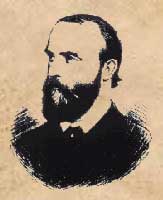The Parnells, a Protestant land-owning family originally came from Congleton,  Cheshire and counted several distinguished persons among their members. Thomas Parnell, who migrated to Ireland after the Stuart Restoration settled in Queens County, had two sons, Thomas, who became a clergyman and poet and John, who became a judge and from whom Charles Stewart was a descendant. Cheshire and counted several distinguished persons among their members. Thomas Parnell, who migrated to Ireland after the Stuart Restoration settled in Queens County, had two sons, Thomas, who became a clergyman and poet and John, who became a judge and from whom Charles Stewart was a descendant.
When Samuel Hayes, barrister, forester and builder of Avondale House died without issue in 1795 he bequeathed his beloved Avondale to his cousin, Sir John Parnell. On his death in 1801, Sir John bequeathed Avondale to his youngest son, William. When William died in 1821 he left the estate to his much-travelled son John Henry who married Delia Tudor Stewart
John and Delia had eleven children in all - five sons and six daughters - nine of whom including Charles Stewart were born at Avondale. Charles the fourth son and sixth child was born on 27th June 1846 when Ireland was in the grip of the famine and the seeds of revolution were being sown. His mother was outspokenly anti-English and it seems that Parnell inherited his intense nationalism from her.
Parnell was elected to Parliament in the Meath-by Election in April 1875 and he joined the Home Rule Party led by Isaac Butt. On 21st October 1879, Davitt founded the Irish National Land League and Parnell was made President. The main objectives of the League were to provide tenants with a fair rent, fixed tenure and free sale. The long-term aim was that farmers would own the land eventually. The Land League also taught the Irish farmers to stand on their own two feet and be able to assert their rights, thus the Land League became popular with the farmers and with it so did Parnell. The Irish people held him in such high esteem that they referred to him as 'Uncrowned King of Ireland'.
The climax to Parnell's career started with Parnell's relationship with Mrs. Katherine O'Shea, much to the displeasure of her husband, Capt. William O'Shea, a former member of the Irish Party. Parnell had been living with her since 1886. Although O'Shea knew of their liaison he delayed divorce proceedings in the hope that he would obtain a substantial sum of money from his wife on the death of her bedridden and aged aunt, Mrs. Benjamin Wood. The wealthy woman had named Katherine as her Heiress but would obliviously alter her will in the event of any scandal. Mrs. Wood died in 1889 and Mr. O'Shea demanded £20,000 from his wife. She refused his demands so Mr. O'Shea promptly filed for divorce in 1890 and Parnell was named in the proceedings.
The verdict of the divorce found Parnell guilty and caused a sensation in England and Ireland, The Irish people were aghast that their 'Uncrowned King' was a mere mortal who had committed a mortal sin. Support for Parnell seemed to waver but his pride would not let him retire from public life.
Parnell and Katherine married at Steyning and the registrar was told to keep it secret. The only witnesses at the wedding were two servants from Mrs. O'Shea's house in Brighton. Less than four months later on 6th October 1891 broken in health if not in spirit Parnell died of pneumonia in the presence of his wife.
In Glasnevin cemetery a granite boulder marks the last resting place of Parnell and in O'Connell Street, Dublin, a massive obelisk of Shantalla granite fronted by a bronze statue of the leader, carries Parnell's own words.
No man has the right to fix boundary to the march of the nation. No man has a right to say to his country - thus far shall thou go and no further. We have never attempted to fix the ne plus untra of Ireland's nationhood and we never shall.'
|
|
|

